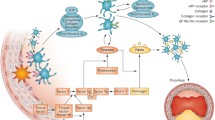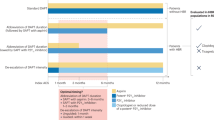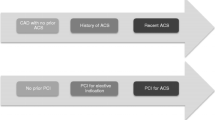Abstract
The incidence of new coronary events in patients receiving dual antiplatelet therapy (e.g. cyclo-oxygenase inhibitors such as aspirin [acetylsalicylic acid; ASA]) and ADP receptor blockers (e.g. clopidogrel) is high. Therefore, it is critical to identify patients who require more intense treatment such as those with poor tolerance to existing drugs, those with genotypes that predict treatment resistance, diabetic patients, and smokers. The new ADP receptor blockers (prasugrel, cangrelor, Ticagrelor) can provide greater efficacy but it should not be associated with increased bleeding. Thrombin receptor antagonists (e.g. SCH530348) are another alternative that is currently being tested in randomized trials.

Similar content being viewed by others
References
Smith SC, Blair SN, Bonow RO, et al. AHA/ACC Guidelines for preventing heart attack and death in patients with atherosclerotic cardiovascular disease: 2001 Update. Circulation 2001; 104: 1577–9.
de Backer G, Ambrosioni E, Borch-Johnsen K, et al. European Guidelines on cardiovascular disease prevention in clinical practice. Third Joint Task Force of European and other Societies on Cardiovascular Disease Prevention in Clinical Practice. Eur J Cardiovasc Prev Rehabil 2003; 10: S1–10.
Eidelman RS, Hebert PR, Weisman SM, et al. An update on aspirin in the primary prevention of cardiovascular disease. Arch Intern Med 2003; 163: 2006–10.
Ridker PM, Cook NR, Lee IM. A randomized trial of low-dose aspirin in the primary prevention of cardiovascular disease in women. N Engl J Med 2005; 352: 1293–304.
Stroke, multi-ethnicity and gender [online]. Available from URL: http://www.thegoddessfund.org/multiethnicity.html [Accessed 2009 Aug 3].
Antithrombotic Trialists’ Collaboration. Collaborative meta-analysis of randomised trials of antiplatelet therapy for prevention of death, myocardial infarction, and stroke in high risk patients. BMJ 2002; 324: 71–86.
CAPRIE Steering Committee. A randomised, blinded, trial of clopidogrel versus aspirin in patients at risk of ischaemic events (CAPRIE). Lancet 1996; 348: 1329–39.
Bertrand ME, Rupprecht HJ, Urban P, et al. Double-blind study of the safety of clopidogrel with and without a loading dose in combination with aspirin compared with ticlopidine in combination with aspirin after coronary stenting: the clopidogrel aspirin stent international cooperative study (CLASSICS). Circulation 2000; 102: 624–9.
Yusuf S, Zhao F, Mehta SR. Effects of clopidogrel in addition to aspirin in patients with acute coronary syndromes without ST-segment elevation. N Engl J Med 2001; 345: 494–502.
Steinhubl SR, Berger PB, Mann JT, et al. Early and sustained dual oral anti-platelet therapy following percutaneous coronary intervention: a randomized controlled trial. JAMA 2002; 288: 2411–20.
Mehta S, Yusuf S, Peters R. Effects of pre-treatment with clopidogrel and aspirin followed by long-term therapy in patients undergoing percutaneous coronary intervention: the PCI-CURE study. Lancet 2001; 358: 527–33.
Sabatine MS, Cannon CP, Gibson CM, et al. Effect of clopidogrel pretreatment before percutaneous coronary intervention in patients with ST-elevation myocardial infarction treated with fibrinolytics: The PCI-CLARITY Study. JAMA 2005; 294: 1224–32.
Sabatine MS, Cannon CP, Gibson CM, et al. Addition of clopidogrel to aspirin and fibrinolytic therapy for myocardial infarction with ST-segment elevation. N Engl J Med 2005; 352: 1179–89.
Vlaar PJ, Svilaas T, Damman K, et al. Impact of pretreatment with clopidogrel on initial patency and outcome in patients treated with primary percutaneous coronary intervention for ST-segment elevation myocardial infarction: a systematic review. Circulation 2008; 118: 1828–36.
Bonello L, Camoin-Jau L, Armero S, et al. Tailored clopidogrel loading dose according to platelet reactivity monitoring to prevent acute and subacute stent thrombosis. Am J Cardiol 2009; 103(1): 5–10.
The Task Force for the Diagnosis and Treatment of Acute and Chronic Heart Failure 2008 of the European Society of Cardiology. ESC Guidelines for the diagnosis and treatment of acute and chronic heart failure 2008. Eur Heart J 2008; 2388–442.
Brar SS, Kim J, Simerjeet K, et al. Long-term outcomes by clopidogrel duration and stent type in a diabetic population with de novo coronary artery lesions. J Am Coll Cardiol 2008; 51: 2220–7.
Angiolillo DJ, Fernández-Ortiz A, Bernardo E, et al. Variability in individual responsiveness to clopidogrel: clinical implications, management, and future perspectives. J Am Coll Cardiol 2007; 49: 1505–16.
Collet JP, Hulot JS, Pena A. Cytochrome P450 2C19 polymorphism in young patients treated with clopidogrel after myocardial infarction: a cohort study. Lancet 2009; 373: 309–17.
Bhatt DL, Topol EJ. Scientific and therapeutic advances in antiplatelet therapy. Nat Rev Drug Discov 2003; 2: 15–28.
Wiviottt SD, Trenk D, Frelinger AL, et al. Prasugrel compared with high loading- and maintenance-dose clopidogrel in patients with planned percutaneous coronary intervention: the Prasugrel in Comparison to Clopidogrel for Inhibition of Platelet Activation and Aggregation-Thrombolysis in Myocardial Infarction 44 trial. Circulation 2007; 116: 2923–32.
Wiviott SD, Braunwald E, McCabe CH. Prasugrel versus clopidogrel in patients with acute coronary syndromes. N Engl J Med 2007; 357: 2001–15.
Wiviott SD, Braunwald E, Angiolillo DJ. Greater clinical benefit of more intensive oral antiplatelet therapy with prasugrel in patients with diabetes mellitus in the trial to assess improvement in therapeutic outcomes by optimizing platelet inhibition with prasugrel — Thrombolysis in Myocardial Infarction 38. Circulation 2008; 118: 1626–36.
Cannon CP, Usted S, Harrington RA, et al. Safety, tolerability, and initial efficacy of AZD6140 the first reversible oral adenosine diphosphate receptor antagonist, compared with clopidogrel, in patients with non-ST-segment elevation acute coronary syndrome: primary results of the DISPERSE-2 trial. J Am Coll Cardiol 2007; 50: 1844–51.
James S, Akerblom A, Cannon CP, et al. Comparison of ticagrelor, the first reversible oral P2Y(12) receptor antagonist, with clopidogrel in patients with acute coronary syndromes: Rationale, design, and baseline characteristics of the PLATelet inhibition and patient Outcomes (PLATO) trial. Am Heart J 2009; 157: 599–605.
Greenbaum AB, Grines CL, Bittl JA. Initial experience with an intravenous P2Y12 platelet receptor antagonist in patients undergoing percutaneous coronary intervention: results from a 2-part, phase II, multicenter, randomized, placebo- and active-controlled trial. Am Heart J 2006; 151: 689.e1–689.e10.
Storey RF. New developments in antiplatelet therapy. Eur Heart J 2008; 10(Suppl. D): D30–7.
Interim Analyses Indicate CHAMPION Program Will Not Meet Efficacy Endpoints Company to Continue and Accelerate Phase 2/3 Studies of Cangrelor in Settings Where Oral Drugs Cannot Be Used or Short Half-Life Is Desirable [online]. Available from URL: http://www.fiercebiotech.com/press-releases/medicines-company-discontinues-phase-3-champion-clinical-trial-program-cangrelor [Accessed 2009 Nov 11].
Coughlin SR. Thrombin signalling and protease-activated receptors. Nature 2000; 407: 258–64.
Spectre G, Varon D. New antiplatelet agents. Curr Opin Hematol 2009; 16: 365–70.
Acknowledgments
Funding for the preparation of this manuscript was provided by Rovi Farmaceuticals. Medical writing assistance was provided by Sofia Perea, PhD on behalf of Wolters Kluwer Pharma Solutions. Dr Magdalena Heras declares honoraria for acting as an expert consultant for Menarini and Astrazeneca, and declares speaker engagements from Menarini, Astrazeneca, Boehringer Ingelheim and Lilly. She has also received research grants from GlaxoSmithKline. Dr Alfonso del Río does not report any conflicts of interest.
Author information
Authors and Affiliations
Corresponding author
Rights and permissions
About this article
Cite this article
Heras, M., del Río, A. Update on Antiplatelet Therapy in Acute Coronary Syndromes. Am J Cardiovasc Drugs 9 (Suppl 1), 13–17 (2009). https://doi.org/10.2165/1153164-S0-000000000-00000
Published:
Issue Date:
DOI: https://doi.org/10.2165/1153164-S0-000000000-00000




